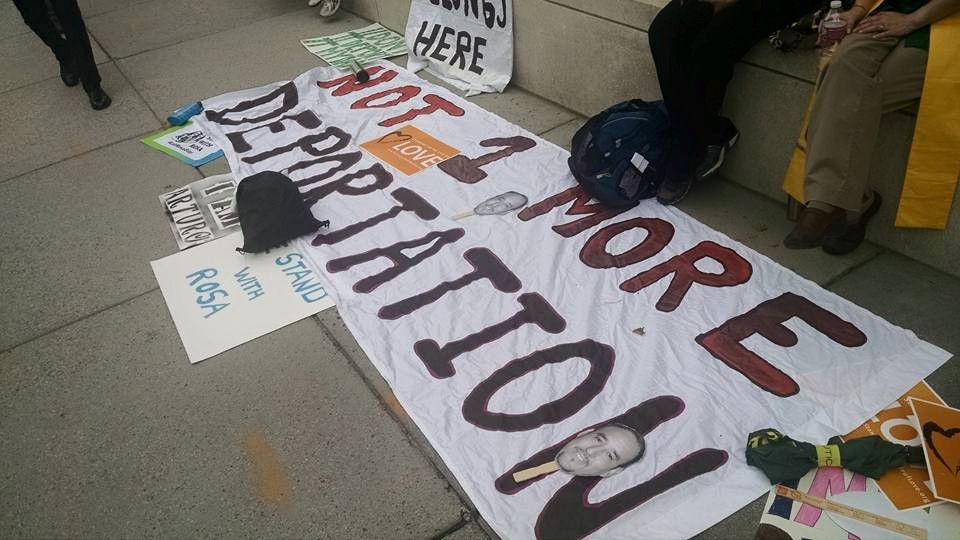
During his tenure as the Moderator of the 221st General Assembly of the Presbyterian Church (U.S.A.), Heath Rada has listened deeply and broadly to people across this denomination. Moderators of the PC(USA) often have this unique and sacred privilege of really listening as they travel and hold conversations with Presbyterians in congregations, presbyteries, synods, national agencies, mission programs, and affinity groups.
In addition to countless informal conversations, Rada initiated an intentional listening project throughout the PC(USA). On a number occasions, he has reported on its emerging themes, including at the outset of the 222nd General Assembly just a few days ago.
In his reporting, Rada has frequently shared this finding with others:
“Justice is part of the DNA of the PC(USA).”
It’s a catchy little phrase. More importantly, however, it is true. We always practice justice imperfectly, but justice and social righteousness are dearly held values within the PC(USA). They are parts of our shared commitments, and they are clearly a part of our shared history. Presbyterians have worked and continue to work for the civil rights and inclusion of individuals and communities that have experienced marginalization and discrimination in the United States and around the world.
The pursuit of justice is truly a part of our collective DNA.
Concern for Continued Justice: The Foothills Overtures
 For this reason, some Presbyterians are concerned about the overtures brought by the Foothills Presbytery to the 222nd General Assembly. Over the last several days, they have been thoroughly considered by the committee on “The Way Forward” and have been recommended for disapproval by the 222nd General Assembly. These overtures seek to make major shifts in the structure and parliamentary procedures connected to all future General Assemblies of the PC(USA). Overture 04-01 calls for a shift to reorganize each General Assembly around one of the Great Ends of the Church. These six Great Ends are listed in the Book of Order as follows:
For this reason, some Presbyterians are concerned about the overtures brought by the Foothills Presbytery to the 222nd General Assembly. Over the last several days, they have been thoroughly considered by the committee on “The Way Forward” and have been recommended for disapproval by the 222nd General Assembly. These overtures seek to make major shifts in the structure and parliamentary procedures connected to all future General Assemblies of the PC(USA). Overture 04-01 calls for a shift to reorganize each General Assembly around one of the Great Ends of the Church. These six Great Ends are listed in the Book of Order as follows:
- the proclamation of the gospel for the salvation of humankind
- the shelter, nurture, and spiritual fellowship of the children of God
- the maintenance of divine worship
- the preservation of the truth
- the promotion of social righteousness
- the exhibition of the Kingdom of Heaven to the world
Overture 04-01 recommends that future General Assemblies be organized thematically around these Great Ends, focusing on one every two years. It reads, “the main business of each General Assembly shall be to discuss and explore ways to enable Presbyterian Church (U.S.A.) congregations and councils to fulfill more faithfully and effectively the Great End which is the theme for that General Assembly.”
___________________________________________
I am stunned to ponder the implications of timing in this proposal. A thematic consideration of the ‘the promotion of social righteousness’ would take place once every eighteen years. Those years mark the span of time from birth to adulthood.
___________________________________________
Every third Assembly (every 6 years) would depart from these thematic foci to consider all amendments to the Constitution that have been properly submitted – according to the overture’s new definition of “properly submitted”. These amendments would require the endorsement of no fewer than 15% of Presbyteries before they could become official General Assembly business. Proposed amendments with concurrence of two-thirds of Presbyteries could be considered for business at any General Assembly.
Our Posture Toward a Changing World
In light of our denominational commitment to justice, some Presbyterians – and I count myself among them – hold deep concerns about these proposed shifts from Foothills Presbytery. We live in a world that is changing rapidly. The arc of history is indeed long with the cry for justice; that is not new. But new movements for social inclusion, empowerment, and civil rights are emerging right now in our nation, our world, and Church Universal. These new movements are raising voices collectively to ensure that the arc of history truly bends toward justice.
 We as people of faith are called to listen, respond, and act. As Presbyterians consider the overtures from Foothills Presbytery, I join many in concern that these changes would effectively tie our hands and inhibit us from responding to emerging needs and movements in a timely way.
We as people of faith are called to listen, respond, and act. As Presbyterians consider the overtures from Foothills Presbytery, I join many in concern that these changes would effectively tie our hands and inhibit us from responding to emerging needs and movements in a timely way.
I am stunned to ponder the implications of timing in this proposal. A thematic consideration of the ‘the promotion of social righteousness’ would take place once every eighteen years. Those years mark the span of time from birth to adulthood. I cannot fathom an outcome which formally places matters of social justice before the General Assembly of the PC(USA) only once per generation.
The Gospel is Intersectional
As Heath Rada’s season of listening has reaffirmed, justice is a part of our Presbyterian DNA. The fact that we as a church and as individuals regularly fall short of this identity does not diminish it fully; it is a part of our collective vision and history. Even more importantly than our own history and tradition, visions of justice are held within the heart of God. We are indisputably called to participate in God’s acts of justice in the world.
 Presbyterians must consider justice in the intersectionality of social identities in our church, nation, and world. These intersections include race, class, sexual orientation, gender identity and expression, disability, immigration status, and more. At the same time, it is important to remember that the Great Ends of the Church are also intersectional. They do not exist in isolation and cannot be siphoned off from one another. How can the ‘promotion of social righteousness’ ever be separated from the ‘proclamation of the gospel for the salvation of humankind’? Or how could it exist apart from ‘the preservation of the truth’? Our scriptures strongly promote justice, and our traditions of truth-telling participate in liberatory movements of the Holy Spirit.
Presbyterians must consider justice in the intersectionality of social identities in our church, nation, and world. These intersections include race, class, sexual orientation, gender identity and expression, disability, immigration status, and more. At the same time, it is important to remember that the Great Ends of the Church are also intersectional. They do not exist in isolation and cannot be siphoned off from one another. How can the ‘promotion of social righteousness’ ever be separated from the ‘proclamation of the gospel for the salvation of humankind’? Or how could it exist apart from ‘the preservation of the truth’? Our scriptures strongly promote justice, and our traditions of truth-telling participate in liberatory movements of the Holy Spirit.
These Great Ends are inseparable from one another and respond to the movement of God in the world. Will we try to protect our church from the anxiety of Spirit-led change, or will we be bold enough to follow with energy, intelligence, imagination, and love?
*****
AUTHOR BIO: Renee Roederer is a PC(USA) teaching elder who lives in Ann Arbor, Michigan. She is a writer, itinerant preacher and speaker, and organizer of a new meetup group called Michigan Nones and Dones.”
Read the Foothills Overtures 4-01, 4-02, 4-03, 4-04, 4-05, 4-06, 4-09, 11-01, and 11-02.






Unbound Social